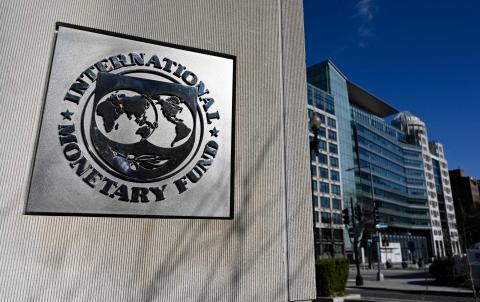Boštjančič, Vasle discuss Slovenia’s relatively good economic situation in Washington

Washington – Global economy is in trouble, but given the circumstances Slovenia is in a relatively good financial and economic shape, Finance Minister Klemen Boštjančič and Banka Slovenije Governor Boštjan Vasle said at the end of the a meeting of the IMF and World Bank in Washington, US. The talks focussed on inflation.
Addressing reporters in Washington, Vasle said the officials had agreed that inflation is the biggest threat to the global economy and prosperity. There were calls against excessive raising of interest rates in the fight against inflation, he said.
“There are two scenarios. The first is that monetary policy would not react harshly to inflation movements, i.e. it would be allowed to remain high for a while. In my firm belief, this would cause much more damage to economic growth and quality of life in Slovenia and beyond than the measure we have chosen, which is a relatively rapid rise in interest rates, which is to bring inflation down to the target level already in the next few years, thereby providing stability for the population, businesses and the country,” the governor said.
Asked how the increase in interest rates would affect households in Slovenia, Vasle replied that the normalisation of interest rates would be felt by businesses, as “we would be coming out of a relatively unusual situation where loans were very cheap and allowed borrowing that was not based on real economic needs”.
For the group of the population that has high savings in banks, coming out of negative interest rates will mean getting interest on their savings again.
Asked how the increase in interest rates would affect Slovenia’s borrowing, Boštjančič replied that Slovenia’s debt position in these markets was very good.
“The cost of Slovenian borrowing will of course rise, but almost in line with the rise in European Central Bank (ECB) interest rates. The interest rate premium, which is largely a result of how investors treat Slovenia, remains stable and we want to keep it that way.
“It is therefore very important what measures we take in the fiscal area,” said the minister, who is also meeting both current and potential Slovenian creditors or buyers of government bonds in Washington.
He described the meeting of the IMF and the World Bank as very intensive, and assured the IMF representatives in Washington that one of the main objectives of his ministry was the development of capital markets and their promotion, and that Slovenia would like to continue its cooperation with the IMF.
“The recurring questions are how Slovenia is getting through the energy crisis, what measures it is taking in relation to high inflation and so on,” said the minister, who has had many bilateral meetings and also group meetings, including the first meeting of the eurozone finance ministers with US Treasury Secretary Janet Yellen, where they mainly discussed aid to Ukraine.
As for measures to fight high inflation, Boštjančič said that there was a consensus that they should be measured, swift or timely and temporary. He pointed to the developments in the UK, where the chancellor of the exchequer had been dismissed over tax cuts, to which the international financial markets reacted negatively, as a good lesson.
“This is a good lesson for us too. In a way, the UK government’s tax measures are comparable to the tax breaks adopted by our previous government. In Slovenia, people talk about required reliefs much too easily. People in international institutions and investors know very well what is happening in Slovenia, what measures the government is taking,” he said.
The IMF has downgraded Slovenia’s economic growth forecast for 2023 to 1.7%, and Boštjančič finds it worrying that the forecast for Germany is even worse. “We should not fool ourselves. Slovenia is one of the European countries that is eventually affected by developments in Germany,” he said.
“When we talk about economic growth, it is becoming increasingly obvious that the Russian invasion, with its consequences, will have a major impact not only on inflation but also on economic growth. Growth projections for the next quarter have deteriorated sharply.
“Specifically for Slovenia, we expect growth to moderate this quarter and remain low next quarter. Nevertheless, we are in the group of countries where growth is expected to continue next year. But it will still be marked by shocks,” said Vasle.
Both Boštjančič and Vasle agreed that the war against Ukraine is the reason for the global economy’s problems, as it is pushing up energy and food prices. “We all want to see an end to this war as soon as possible,” Boštjančič said. Vasle added that the effects of the energy crisis would continue to be felt next year. The ECB has started to fight inflation, raising interest rates twice in the last three months, he noted.
He stressed the importance of coordinated action, particularly in monetary and fiscal policies, where the EU is in a unique position, with a single monetary policy facing 19 different fiscal policies.
“From the IMF’s perspective, Slovenia is in a very privileged group of countries. Within the IMF, there are countries that are facing deeper problems in terms of energy or food challenges. We have discussed these challenges at the IMF and some of the initiatives from the past, such as the Resilience Facility, have already been implemented. Slovenia supports these initiatives and is ready to support them financially,” Vasle said.
The post Boštjančič, Vasle discuss Slovenia’s relatively good economic situation in Washington appeared first on Slovenia Times.
- Log in to post comments










